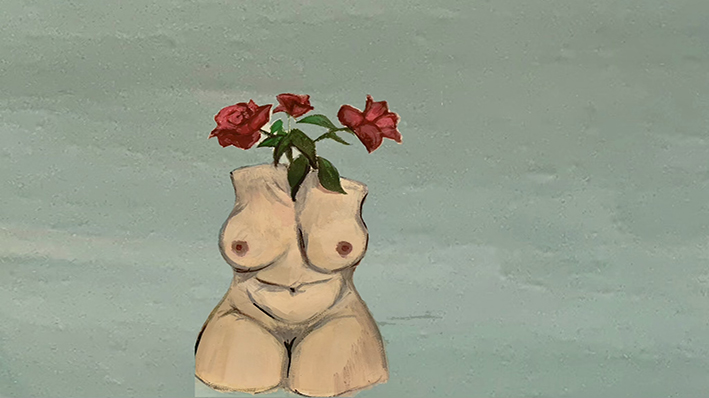
C.S. Levin 2020
Eating disorders are tricky. They discretely camp at that intersection of body and mind as a mental illness with potentially life-threatening consequences. After having been diagnosed with anorexia nervosa in May of this past year, I know now that sickly weight loss is but the tip of the iceberg— the uphill battle towards recovery consists of much more than what meets the surface.
Looking back at 2020, I realize that it was around this time last year that I jotted down as one of my resolutions to “develop a normal relationship with my body and food”— a euphemism for the destructive behaviors I had been developing since age twelve. Three months later, shit hit the ceiling with Covid-19, and I was back home confined with my family. And I hit my own all-time low.
The daily routine speaks for itself. Every morning was marked by appetite suppressants and intensive cardio. I would fast all day with the exception of coffee and a protein shake in the afternoon. In the evening, I couldn’t avoid dinner with family— nor could I avoid the guilt-induced emotional breakdown five out of seven days a week.
There were also the laxatives to purge any “excess”. I was fitting into clothes from the 6th grade. I hadn’t had a period for a year. Those close to me told me I looked unhealthy. And yet, I still didn’t think I was sick— or rather, sick enough.
It took being confronted by a couple incredible friends in my close circle to make me realize that this was not normal and that I needed professional help.
In the In-between
Months later, we’re weight restored, eating meals with friends and family, no routine purging. It’s hard to explain to some, including myself, that that does not equate being recovered.
Seven months into recovery, no longer is there a single narrative in control but rather two in conflict: recovery vs eating disorder. Meanwhile, you are stuck in the in between. This in between entails an exhausting cycle for every single decision made— every meal, every plan, every step, every thought is accompanied by the question “which path do I choose?”, followed by shame for whichever you neglected.
The disordered voice is less than it was once was, but it still sleeps under the same sheets as you. It is still there to whisper in your ear every destructive thought that led you to where you are now.
Recovering from anorexia means an inner battle to make room for your own voice given for so long the eating disorder’s commands was all you could hear. The more initiative you take to free yourself from its restraints, the more creative the eating disorder becomes to take control anew. The cycle is as perpetual as it is exhausting.
The answer of which path to choose becomes much blurrier when you are no longer evidently killing yourself. Now, you are existing. But existing is not recovered.
There was a period when I could honestly say gaining weight and losing control of my habits was more terrifying to me than the pandemic. I denied being sick because I could not bear the thought of no longer having the comfort of my eating disorder. I can now say aloud that I still am sick. I am not recovered—yet. I am not even sure what recovered looks like yet, but I know that this everyday internal battle is definitely not it. Despite this, I can say that I am better and that I am recovering. I can also say that I now want so much more from my life than merely existing.
Coping in this in-between entails the eating disorder’s restraints being felt in a far more nuanced way in the everyday. Countless little things still trigger inexplicable tears or lead me to having to leave the room. Grappling with those moments are particularly challenging given I ask myself what the hell is wrong with me that I cannot hold myself together like a normal person— why this is all so hard? In those moments I have to remind myself that I am not yet recovered.
FACING DIET CULTURE
My reason for writing this is two-fold. For one, sharing my narrative of living in the midst of the struggle is a truth I wish I could have heard earlier on in my recovery— it’s a testimony I wish I would encounter more frequently right now. Eating disorders are so much more common than what the stigma surrounding the subject suggests.
Encouraging more exchange and an overall better understanding of how eating disorders manifest could help many recognize their illnesses earlier on as well as allow for a more reassuring environment for recovery— the struggle is always easier when you know you’re not going at it alone.
Along with that, I wanted to voice my experience because of my frustration with confronting diet culture while in recovery. We tend to speak of diet culture as some external force embodied by mainstream media, magazines, influencers, etc. It’s easy to overlook the extent of which it’s been internalized in each of us.
our skinny obsession
We often fail to catch when we ourselves become mouthpieces for this damaging rhetoric: conflating size and health by glorifying “skinny” regardless of the means; casual talk of self-policing what, when and how we eat; worshipping thinness while entrenching “fat” and “gaining weight” as inarguably pejorative; equating exercise with self-punishment/ prevention from getting “fat”; talk about not eating before going out to look good in x outfit; talk about ignoring hunger cues; talk about skipping meals; commenting on other people’s body (period); “I gained weight”, “I’m getting fat”— those words echo so loudly in the ears of someone who is trying to undo all they’ve been taught to now perceive the weight they gain as the thing that is saving them.
How do you grapple with the changes occurring to your healing body when you are constantly reminded that those changes are to be rejected?
body-rhetoric damage control
Most of my friends have been guilty of these slips, even those well aware of my being in recovery. The intent is not at all to shame anybody— again, for most this type of rhetoric is entirely subconscious. The point is that most do not recognize the destructive culture they are sustaining, pinning girls as enemies to their own bodies. But I do, and yet I don’t say anything.
I get so angered by those that advocate for body positivity yet absent-mindedly drop this rhetoric that contributed to so much damage in my own life. But then again, who am I to be an advocate when I’m the biggest product of the culture?
I hold my tongue because I assume that I’d be a fraud for calling anyone out. I equally convince myself that I should be too ashamed to speak up knowing my eating disorder is not something fully buried in my past.
MOVING FORWARD
I realize now that I am not a fraud. My anger is merited as I’m one of many who has fallen as an ultimate victim to this diet culture.
Today, I am no longer that same victim to it which is why I want to play a role of actively combatting it, both within my own internal battle as well as in my everyday exchanges with others. With that, I know that I am actively recovering, each day attempting to claim a bit more ownership over my life.
It’s challenging. Some days are real fucking hard. Some days I ask myself whether the energy is worth it since I am so tired of fighting myself. Some days all I want is to cry and scream.
But there also comes a point of getting sick of being sick. At that point, the reasons to make the effort to keep moving forward come easily. The image of the potential life that lies ahead gets a bit clearer. That’s when recovery becomes worth it.
About the Article
A perceptive reflection on recovery from the societal repercussions of an eating disorder.



